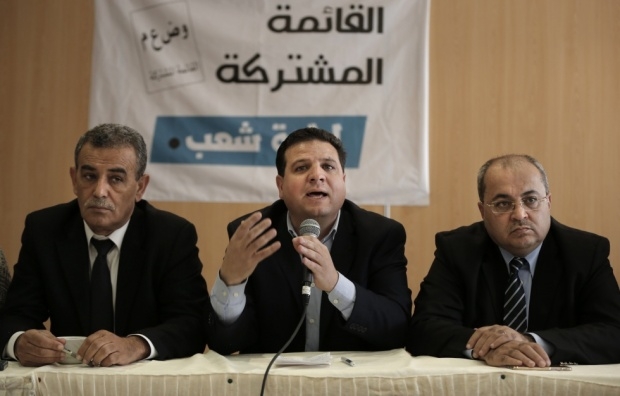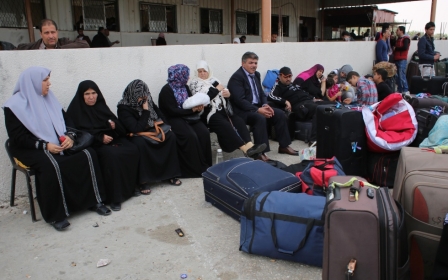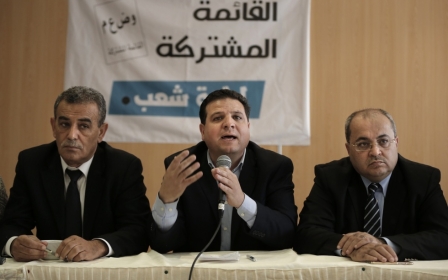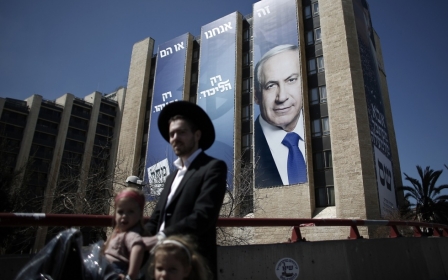INTERVIEW: Balad party leader Dr Jamal Zahalka

For the first time in the history of the Arab world, Arab nationalists, communists and Islamists have joined forces to campaign under one list for seats in the Knesset in next week’s Israeli general election.
This unity for the Arab parties was born out of necessity - changes in the rules which raised the threshold of the percentage of votes needed to enter the Knesset.
But the result of unity could mean the number of non-Zionist members of the Knesset could rise from 11 to 15. The architect and prime mover of this deal, Dr Jamal Zahalka, leader of Balad, tells Middle East Eye how significant this is, and what forces are at play in his community.
MEE: How will the United List affect the balance of forces in the Knesset?
Jamal Zahalka: Of course we are waiting for the elections, but I can say to you now that our political weight will be greater and we will have more members in the Knesset. I just met the European ambassadors in Tel Aviv and all of them came to listen to us and they are speaking to us not as parties but as representatives of the national minority. Now the people in our community are strongly supporting the new United List.
MEE: How many seats do you expect?
JZ: We are aiming for 15. It depends on voter turnout in the elections. Because in any case we will get more than 80 percent of the voters of our community. I am saying 15 on the assumption that Arabs will vote in the same numbers as the Jewish community. At the moment we suffer from under representation because there is a gap in the participation of Arabs and the participation of Jews. In the last election only 56 percent of Arabs voted compared to 70 percent of Jews. If both communities participate to the same extent we will get 15 seats.
MEE: What effect will the United List have on the balance of forces in the Knesset?
JZ: It's called the United List and not the United Arab List because there are Jews in it. We have Mr Dov Khanin who is the eighth candidate on the list from Hadash and Mrs Leah Tsemel who is 20th from Balad. Fifteen seats in the Knesset could make a big difference in Israel. The last election block of the right wing was 61. If it was 59, then two seats could change everything - especially Netanyahu’s hopes for a third term. We could influence that.
MEE : Are you not dismayed that Herzog attacks Netanyahu for the money spent on settlements rather than the settlements themselves?
JZ: No, because they are not so different from Netanyahu. The Labor Party is Likud B. You cannot find any significant difference between them and Mr Netanyahu. They are for the Judaisation of East Jerusalem. They are the engineers of the racial discrimination system against Palestinian citizens of Israel. They supported the war in Gaza. So instead of providing an alternative to Mr Netanyahu, they attack him on corruption. You know that the last accusation against Mr Netanyahu is that he is spending money on his house. It's like Al Capone being prosecuted for tax evasion. Mr Netanyahu should be accused of killing 2200 people in Gaza - among them 400 children, of destroying 93 families, of attacking Palestinians time after time. This is the real charge he should face in court. The money is marginal. It's a tragedy even to speak about the history of corruption of Netanyahu.
MEE: Dr Mohammad Shtayyeh from the Palestinian Authority said that '48 Palestine will play a much bigger role in the Palestinian-Israeli conflict. How do you react to that?
JZ: Let’s put our unity in context. This is the first time in the history of the Arab nation, that the communist stream is going with the national stream and the Islamist stream. This is unprecedented. It has not happened before. We are living in a crazy Middle East. There is polarisation all over the Arab world and communities, and even in the UK Arab communities are polarised. We are surrounded by polarisation, wars and sectarianism, and we decided to protect our community from all of that. Of course we see also the Palestinian split between Hamas and Fatah, between Gaza and the West Bank. We hope that our unity is a message of unity to the Palestinian people. Of course we want to play a bigger role in Palestinian politics and try to push the parties to come to some sort of unity. It's a very important message to the Palestinian parties that there is a part of our people, an important part of '48, are united, so it's a message of unity to our people.
There were three factors behind the United List: firstly the overwhelming support in our community for unity. Ninty percent are in favour of it. The second reason is the rise of Israeli racism and fascism. The lesson from the 20th Century is that fighting against racism and fascism needs unification with all forces who are against it. So we should start with our community for building on that with others in Israel to isolate racism. It’s a political strategy that we should adopt and we can’t adopt it if we are divided. The third reason was that the Knesset raised the threshold to 3.5 percent, which means about four seats in the parliament. All the Arab lists were close to that, and in devising this rule, [Israeli Foreign Minister Avigdor] Lieberman and the Israeli right calculated that nationalists would never join communists. They were wrong and we can turn our unity into a weapon against Lieberman.
MEE: What is your reaction to Haneen Zoabi’s victory in the High Court?
JZ: Haneen’s case in the High Court highlighted the gap that exists between concrete charges and the incitement against her, the demonisation of her, and political claims that she was supporting terror against the Jews. When the court heard the facts, the whole picture changed. Eight out of nine judges supported her right stand to for a seat in the Knesset. In any case, in her declaration to the court, Haneen Zoabi insisted that she is not ready to call the Palestinian struggle terror, whatever the price of that stand will be to her, because it is a legitimate struggle for national liberation. Haneen emphasised the importance of being in the Knesset. If she said what she has said, without being a member of the Knesset, no one would have taken the slightest notice. There were four leaders from our community on the Mavi Marmara, but all the news was about her. What made Israel crazy was that she was on that ship as a Knesset member. The challenge is all the more effective for being a Knesset member.
MEE: What is the atmosphere like in '48 Palestine?
JZ: Israel is moving to the right all the time. The competition in the Knesset is between parties who can propose even more draconian laws against freedom of speech and against our rights. Racism is celebrated in the Knesset. It's one-way traffic. At the moment the count is more than 50 discriminatory and racist laws - not in their language, but in their implementation. All the laws over the confiscation of land have the practical effect of taking lands from Arabs and handing them over to Jews.
The most racist laws are about housing and lands. The communal villages law says that the admission committee in every village has the right to refuse a candidate applying to live in the village if he is deemed not to be socially acceptable. So a candidate has to agree to the Zionist colonial values, which of course no Palestinian will. And if you say you agree with these values you are lying. So they passed a law after the High Court in Israel granted the right of a Palestinian-Israeli family to live in a Jewish village. So you now have a law that allows refusal on the grounds that you are an Arab. This is the intention. Villages govern about 70 percent of the land.
There is another law, the land administration forum, which is selling lands of the refugee. These have been state lands until now but when they are in private hands, you can't demand it back. According to international law, the state is not allowed to dispose of the lands of refugees, of those dispossessed by war. That does not apply if the land is in private hands. Selling the lands of Palestinian refugees has a political dimension in the future. I stood in the Knesset and said: "You Israelis are not buying lands in good will because it's not your land, it's stolen land." And I also went to the Palestinian leaders to say that. Because I imagined the negotiations after 20 years speaking about these lands - and you can't demand it, because the Israeli citizens will say, I just bought it. Or I didn’t know it belonged to somebody else.
I live in Kofor Qari. Before 1948, we held 28,000 dunums. Now we have 7,500 dunums. And all the lands which were confiscated for development purposes is not used for development at all, so we can re-demand it. But there is another point in the law, saying that if your land was confiscated more than 25 years ago, you can't demand it. I spoke about the law in the Knesset and said: “You are cheating us, this is not law.” The speaker of the Knesset (who at the time was Rivlin) said: “Dr Zahalka, you are in a democratic state. You can convince the members of the Knesset on your views and then we will vote, this is democracy. At least you have to admit you are enjoying democracy and the freedom of speech, you can protest against the law.” I replied: "You are offering me an unfair deal. Taking lands and giving me words." He said: "Give me your land and I give you democracy.”
Now there is a lot of anger and frustration in our community. People are angry and that comes out in incidents like Kfar Kana, where there was a general strike on the second day and mass demonstrations. There were demonstrations throughout the attack on Gaza. People were not afraid and hundreds were arrested and we were attacked. Even me as Knesset member, they broke my bone. Palestinians in Israel are becoming more assertive. We insist more on our rights. An example - they wanted to confiscate hundreds of dunums of land in the Negev, and to expel about 40,000 people from their homes and lands in the so-called unrecognized villages. This was the Prawer Plan. I was one of the people who said that we have no choice but to win this. And we won after clashes with our young people who closed the streets in many areas - Umm al-Fahm, Nazareth, everywhere. There was a youth movement, most of them from Balad, and also from other parties, who made big demonstrations and clashes with the police. I was there, Haneen was there, and many other leaders. And at the end of the day the government decided to freeze this law and to withdraw it from the Knesset. Now they are trying other ways.
What I am saying is that it is less easy for the government to take our rights. Oppression becomes harder for them, because of our confidence, and strength is growing. Now I want to make this new face in which our community is rich with talents and people. And I want to organise it to be more unified. We are making enormous efforts to politicise and channel popular anger.
MEE: Obama and Kerry obviously hope that Netanyahu’s departure could once again unlock negotiations between the Palestinians and Israelis. What is your analysis of that?
JZ: What ever will be the result of the election, the Israeli policy is not going to change. Because Israel is adopting the strategy of conflict-management not conflict-resolution. The Israeli negotiator worked in the framework of conflict-management and Palestine had the illusion or the dream of conflict-resolution. I think it's a real tragedy, I don’t think in any way Israel has the internal strength or the will to make the changes that are needed. Unless there is real pressure on Israel, nothing will change. For example, Netanyahu is a very extreme person, right wing. I know him very well, because I am in the Knesset all the time, but at the same time he is a very weak prime minister. Not like Sharon or other leaders. If you put pressure on him, he caves in. If you negotiate or are soft with him, he becomes arrogant and you will not gain concessions. There is a difference between being extreme and strong. It's not the same thing.
MEE: What pressure do you have in mind?
JZ: There is a consensus in Europe that settlements should be stopped, and construction should at the very least be frozen. So why don’t we have a campaign in Europe making boycott and sanctions on Israel conditional on settlements? I am telling you things would change. Netanyahu would surrender on that. I remember when the Europeans made small conditions on the labelling of products from settlements. Israel went crazy, but when the EU insisted on that, Ehud Olmert, who was then Industry Minister, signed the agreement. The point is that nobody tried real pressure over Israel; every time there is a real pressure, Israel backs down.
MEE: Is Oslo finished?
JZ: The damage that Oslo has inflicted on the Palestinian people continues. This is far from finished, but the two-state solution itself is dying. Oslo allowed Israel to perfect its ultimate strategy for perpetuating occupation which is segregation of the Palestinian people. This is the ultimate divide-and-rule, dicing the Palestinians up into Gaza, West Bank, Jerusalem and in every place you have checkpoints, dividing Palestinians further into Druze, Muslims, Christians. Israel is not one regime, but several. The first is the mother regime, where Israel is democratic only for the Jews in Israel. There are many problems with that, especially for Oriental Jews, but it is still one regime. Then there is a sub-regime for the Palestinians in Israel. This is a regime in which discrimination is institutionalised. Then there is another regime for the West Bank, which is apartheid in the South African meaning of the word. A fourth regime exists for the Arabs in East Jerusalem, and the weapon of choice is Judaisation and giving Arabs a separate status. A fifth regime exists for Gaza, which is a prison camp and where Israel plays the role of the warden. A sixth regime exists in the Golan Heights, which is occupation. All of these separate states of governance cause problems for the mother regime.
MEE: What conditions could be created in which real negotiations could take place?
JZ: To avoid talking about the end of Zionism - one of our tragedies is that the world is not aware that Zionism is no better than apartheid - I prefer instead to talk about the end of the Zionist hegemony. The end of Zionist hegemony is the start of real peace or reconstitution, because the principle that ended apartheid in South Africa was that racism should be defeated not compromised with. And this is a racist system so it should be defeated. There should be no compromises with it.
After this has happened, we have to take into account the reality of our situation, where there are Jews with political, cultural and religious rights, like any other people in the world. Two children, one born after love between parents and one born after the brutal rape of his mother, have the same right to live. When I say I am ready for a compromise, it doesn’t give legitimacy to the rape and when I say I am ready for a historical compromise, it does not mean any compromise on history. We have then to look for a framework in which Jews and Arabs can live together.
The principle is of a state for all its citizens. The citizen should have all his rights, not only individual but group ones. It includes the right to belong to a national, linguistic, or cultural group, of belonging to a national group or linguistic or cultural group. Having cultural rights, group rights, is part of individual rights. But now as you see, the Palestinian national movements, even Hamas, adopted the establishment of a Palestinian state. We are not going to oppose that, we are saying that things are changing and we should try to think of alternatives for that. That’s why for example in our party Balad we have a decision to open the discussion of “the one-state solution”. It has full legitimacy and in my opinion this should be the solution at the end of the day because of geographical reasons, because of the refugee issue. We could not be solved in a two-state solution for many reasons.
And even if we have two states that should be a step for one state. That’s the point. I’m not optimistic that we are going to go to that in a smooth paved way. It's going to be a very, very hard and stony way in which unfortunately nothing will change in the Israeli society. For as long as Israelis fail to pay the price for the policy of Netanyahu, he will continue to tell them: ”Look, I built the settlements, I can do what I want in Jerusalem, the occupation is continuing and there is economical prosperity and our relations with the world are unaffected.” So why to change? If there is no pressure from the world nothing will be changed. I do remember what professor Yeshayahu Leibowitz said in 1967. He said that the occupation should be ended, with or without an end of conflict. And he forecast that Israel would become a police state, whose purpose was to dominate a hostile Arab population. Both predictions came true.
New MEE newsletter: Jerusalem Dispatch
Sign up to get the latest insights and analysis on Israel-Palestine, alongside Turkey Unpacked and other MEE newsletters
Middle East Eye delivers independent and unrivalled coverage and analysis of the Middle East, North Africa and beyond. To learn more about republishing this content and the associated fees, please fill out this form. More about MEE can be found here.




